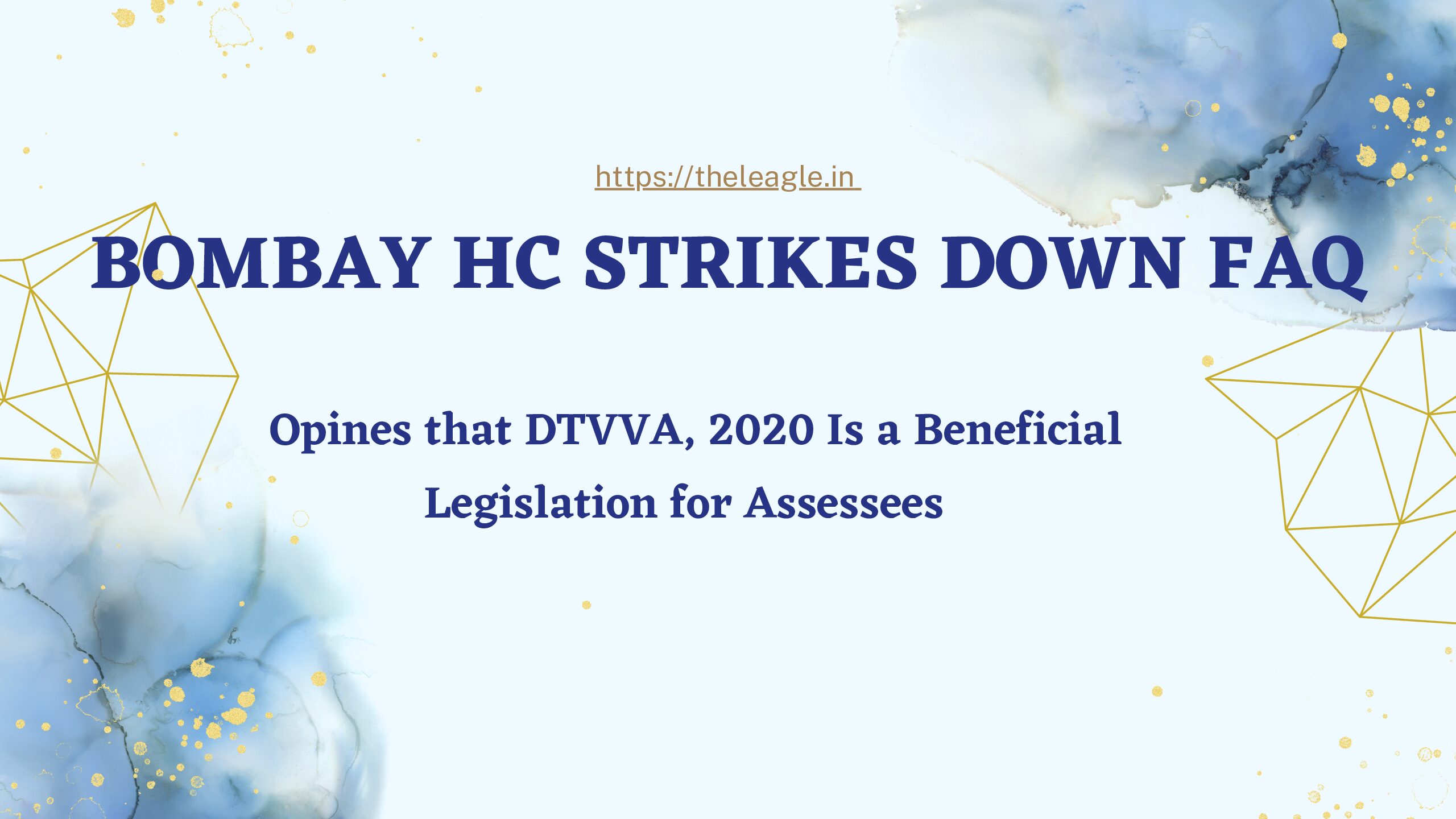In a recent judgment[1], the Bombay High Court rejected an interpretation adopted by the Revenue Department which was prejudicial to the assessee. The case concerned answer to a Frequently Asked Question (‘FAQ’) which the High Court struck down as not in accordance with the object of Direct Tax Vivad se Vishwas Act, 2020, a beneficial legislation for assessees.
Facts
Assessee had filed an appeal before ITAT under Section 253, IT Act, 1961 on 30 September 2014 which was dismissed on 20 May 2016. The assessee filed a Miscellaneous Application (‘MA 1’) on 17 September 2016 seeking adjudication on grounds 3 and 4 which remained undecided by the ITAT. The ITAT passed an order on 14 May 2019 modifying its earlier order which was given effect to by the Deputy Commissioner of Income Tax. The petitioner then preferred another Miscellaneous Application (‘MA 2’) seeking adjudication of ground 4 which still remained undecided. MA 2 remained pending at the time of filing of petition by the assessee before the Bombay High Court.
On 17 March 2020, Direct Tax Vivad se Vishwas Act, 2020 (DTVVA, 2020) was passed and petitioner on 30 January 2021 made an application to seek its benefit. However, the petitioner’s application was rejected on the ground that it was not eligible to avail the benefit under DTVVA, 2020.
Arguments
The assessee argued that its application under DTVVA, 2020 could not be rejected since MA 2 was pending adjudication at the time of application, and a pending appeal was one of the eligibility conditions under DTVVA, 2020. And the State could not argue that MA 2 was not maintainable; the assessee was in litigation at the time of introduction of DTVVA, 2020 and eligible to receive its benefits. The assessee pressed home the point that MA 2 was filed since one of the grounds (ground 4 )remained undecided by ITAT, and MA 1 was held to be admissible for want of adjudication on ground 3 and ground 4. Thus, there was no reason to dismiss MA 2 was being infructuous or barred due to res judicata.
State’s order rejecting the assessee’s application stated that the assessee had applied under DTVVA, 2020 against MA 2 which was filed against the dismissed appeal. The State reasoned that an examination of ITAT’s order reveals that the assessee’s appeal was not dismissed in limine as ITAT had discussed the issue involved. Thus, as per the State, assessee was not eligible to apply for DTVVA, 2020.
Bombay High Court Find in Favor of Assessee
The Bombay High Court noted that MA 2 is pending as a matter of record. And that the High Court cannot proceed on the basis that MA 2 might be rejected. Instead, the High Court observed that it cannot be ignored that MA 1 was decided in favor of the assessee. Thus, MA 2 should be treated as an application that is pending for adjudication on ground 4 which remained undecided in appeal. Having decided this crucial fact, the High Court examined the ‘FAQ’ which formed the basis of the State’s rejection stated above.
FAQ 61 issued under the DTVVA, 2020 clarifying eligibility criteria stated that:
61. Whether Miscellaneous Application (MA) pending as on 31st January 2020 will also be covered by the Scheme?
Ans. If the MA pending on 31st January 2020 is in respect of an appeal which was dismissed in limine (before 31st January 2020) such MA is eligible. Disputed tax will be computed with reference to the appeal which was dismissed. (emphasis added)
The Bombay High Court referred to the objective of DTVVA, 2020, i.e., to reduce pending income tax disputes, generate timely revenue for the Government, and provide certainty to taxpayers. In light of this objective, the High Court noted that the qualifying words ‘in limine’ introduced in FAQ 61 were contrary to the object and reasons of DTVVA, 2020. The High Court cited a slew of precedents to highlight that a beneficial statute must be interpreted to provide the complete remedy which the statute seeks to provide. In view of the same, it struck down FAQ 61 reasoning that DTVVA, 2020 was a beneficial statute and addition of the words ‘in limine’ was adverse to the interests of the assessee and contrary to the objects of DTVVA, 2020.
Conclusion
The Bombay High Court’s approach in the impugned judgment is an example of a court carefully examining the issue at hand, and using the relevant jurisprudence to adjudicate in favor of the assessee by providing adequate reasoning. The State’s denial to the assessee’s application under DTVVA, 2020 was based on thin grounds and the High Court was correct in scrutinising the order and striking down the edifice of the State’s order.
[1] Oerlikon Balzers Coating India (P) Ltd v Union of India 2023 SCC OnLine Bom 1295.
